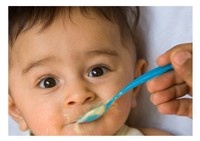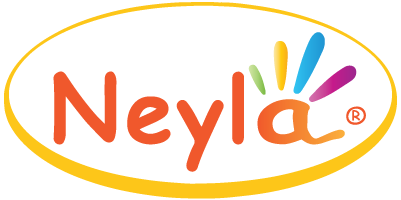Weaning
There are thousands of books, magazine articles and advice pages, both medical and experience-based, which prepare you for your baby’s weaning period.
This is the time when your baby starts to grow faster and the nutrition and energetic value of milk, either from mummy’s breast or the first instant formula, is simply not enough to meet their needs.
Each baby is unique in their development, needs and appetite, so what is valid for one can be inappropriate for another.
Beginning of weaning

Lots of parents wonder when and how to start weaning. The best way is to introduce solid foods alongside breast milk or first baby formula when there are certain signs that, when they appear together from around 6 months of age, show that your baby is ready for the first solid food experience.

Your baby is most probably ready for the introduction of solid food when he or she:
- Is able to stay in a sitting position, holding its head steady;
- Coordinates his or her eyes, hands and mouth – can look at his or her food, pick it up and put it in the mouth;
- Is able to swallow the food rather than spit it back out;
- Has increased appetite and is demanding more frequent milk feeds;
What to feed your baby?
 From around 6 months
From around 6 months
At the beginning your baby only needs a small amount of solid food, once a day, at a time according to your or its preferences.
You can start with single vegetables and fruits – mashed, blended, or soft cooked sticks; for example parsnip, carrot, broccoli, potato, sweet potato, apple or pear.
You may also try baby rice mixed with your baby’s preferred milk.
Nutrition specialists recommend introducing allergen foods to baby fairly early. This step is beneficial in terms of preventing allergies.
Don’t forget to introduce foods that can trigger allergic reactions one at a time, in little amounts, so that you can spot any reaction if it occurs.
Here’s a list of potential food allergens that can be introduced from around 6 months as part of your babies’ diet (with the exception of gluten which can be introduced from 4 months):
- cows’ milk
- eggs (boiled)
- foods that contain gluten including wheat, barley and rye
- nuts, peanuts (serve them crushed or ground) and seeds (serve them crushed or ground)
- soya
- shellfish (don’t serve raw or lightly cooked)
- fish
 From 7 till 9 months
From 7 till 9 months
By now, your baby will have had some good practice learning how to eat. Offering a wide variety of different foods is important to ensure they get enough energy and nutrients (such as iron).
Salty food isn’t good for babies’ kidneys and sugar can cause tooth decay so you should avoid these as much as possible.
Don’t be frustrated and remember that it may take 10 tries or even more for your baby to get used to new foods, flavors and textures. Just be patient, keep offering. There’ll be days when they eat more, some when they eat less, and others when they reject everything. This behavior is perfectly normal, don’t worry.
From 10 till 12 months
Your baby should now be used to having 3 meals a day in addition to their milk feeds.
Try to eat together as much as possible, babies learn from watching you eat and make sure you include a wide variety of the following food groups in your baby’s meals:- Vegetables – your baby should now be able to manage mashed, lumpy, chopped and finger foods. Offer a variety of vegetables, including ones with bitter flavors.
- Fruits - wash fruit and remove any pips, stones or hard skin – chop the fruit up or offer as finger food.
- Starchy foods - can be offered as mashed, chopped or finger foods. Cereals can be mixed with breast milk or first infant formula.
- Protein foods - includes meat, fish, eggs, beans and pulses. As well as giving your baby protein, these foods contain other useful nutrients, such as iron and zinc, which are important for babies.
- Dairy – can include full-fat, unsweetened or plain yoghurts. Whole pasteurized (full-fat) cows’ milk, or goats’ or sheep’s milk can be used in cooking or mixed with food from around six months old, but not as a drink until your baby is 12 months
From 12 months
Your 12-month-old toddler should be having 3 meals a day. They may also need 2 healthy weaning snacks in between (for example fruit, vegetable sticks, toast, bread or plain yoghurt).
Remember, they don’t need salt or sugar added to their food or cooking water.
Please consider this guide as an indication only. If in doubt, ask your pediatrician for advice on menus adapted to your baby!




